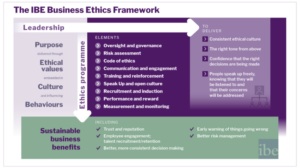What is the Institute of Business Ethics
19th February, 2024
As chair of the Institute of Business Ethics (IBE), that is a question that I am regularly asked.
We exist to champion the highest standards of ethical business behaviour. So we have a lot in common with the Good Business Charter – of which I am a big fan.
Charles Wookey and the late Loughlin Hickey, who did so much to establish Blueprint for Better Business used to say, only half-jokingly, it had taken them a year to develop their foundational one-side of A4 Blueprint Principles: https://www.blueprintforbusiness.org/the-principles/
And then a second year to produce Blueprint’s Framework for becoming a Purpose-led business: https://www.blueprintforbusiness.org/the-framework/
Well, in a similar spirt of partial jocularity, and recognising the value of brevity and “simplicity the other side of complexity,” I’d say, it has taken the IBE almost forty years, to refine down to a single side of A4, the essence of what we know about striving to do business ethically. In our case, this is our Business Ethics Framework. See below.

It starts with being purpose-led – so close links there to Blueprint; ethical values, leadership at all levels of a business; and all helping to shape organisational culture: the way we do business around here, especially when we think no one else is watching! In other words: behaviours: how does an organisation want and expect its employees to behave: to each other, to customers, suppliers, competitors and communities from which the business derives its licence to operate.
Supporting all of this, the IBE believes are some critical foundations. These include having a robust Code of Ethics which explains in simple language, how the business expects its
employees to behave to each other, to customers, suppliers, business partners, competitors and society at large. Is this Code regularly updated? Is it easy to find – or conversely one of those policies “somewhere on the company Intranet?!”
Are the key messages of the company’s Code of Ethics shared in induction of new employees? In regular training and refresh sessions? Does the business try to bring their Code of Ethics to life with real-world ethical dilemmas that people in the business have actually faced? Are leaders at all levels of the organisation talking about behaving ethically – and exploring openly some of the “grey” areas when it comes to ethical decision-making?
Amongst other foundational elements are the links to management training and especially to first-line management training. As a Companion of the CMI (Chartered Management Institute) I have reverberating around my brain, the fact that, according to CMI/YouGov research, 82% of new managers in the UK have received no formal management training before taking up post. It is also important to link ethical behaviour to rewards and recognition. I suspect many of us will know of organisations that talk a good talk on doing business ethically, but still reward and recognise “rainmakers” who bring in the results, no questions asked! And is there a genuine “speak-up” culture, so that issues are raised early, rather than when things have deteriorated massively, and employees have to resort to the “nuclear option” of “whistle-blowing?”
To help businesses large and small, to embed the different “building blocks” of the Business Ethics Framework, the IBE has lots of Good Practice Guides, Board Guidance and innovations notes, in our IBE Knowledge Hub: https://www.ibe.org.uk/knowledge-hub.html
Having all of these foundations in place does not automatically guarantee that a business will always behave ethically – all human institutions – by definition – are fallible; but having these different components of the Business Ethics Framework provide the best “fighting chance” of avoiding ethical lapses – or ensuring faster recovery if ethical misbehaviour has occurred.
In support of all of this, the IBE has a Triple-A role: as Authority on doing business ethically, as an Adviser to individual businesses (often when they need extra help after some ethical problems) and as an Advocate for the positive business case for doing business ethically (as well as it is just better business and the right thing to do!).
As our supporters know, we aim to fulfil the Triple A role through a variety of means including board briefings, Good Practice Guides, webinars, training programmes and working internally with individual businesses.
Business never stands still and the issues confronting businesses that want to behave ethically, continue to expand. In the coming months, therefore, we will be paying particular attention, for example, to the issues of using Artificial Intelligence ethically and safely; and how young people think about what it means to do business ethically.
All of this is why the board and executive team of IBE are so clear that the need for an organisation like the IBE is even more relevant today that when we were founded almost
forty years ago. I would also argue that we are a perfect “Yin” to the “Yang” of the ten specific commitment areas of the Good Business Charter. Uniting the work of both the IBE and GBC is a sense of fairness, of treating others fairly.
David Grayson is chair of the Institute of Business Ethics.

